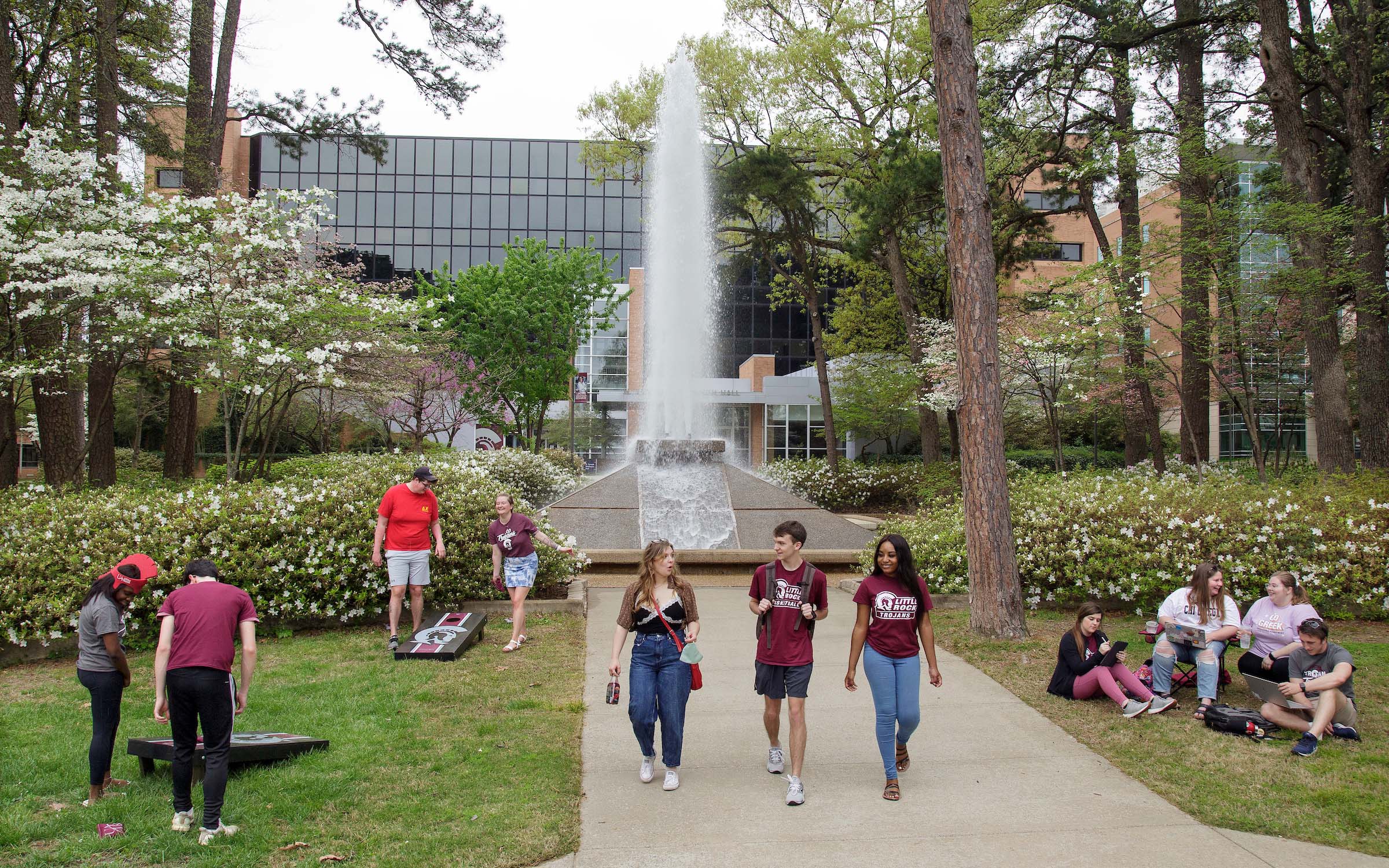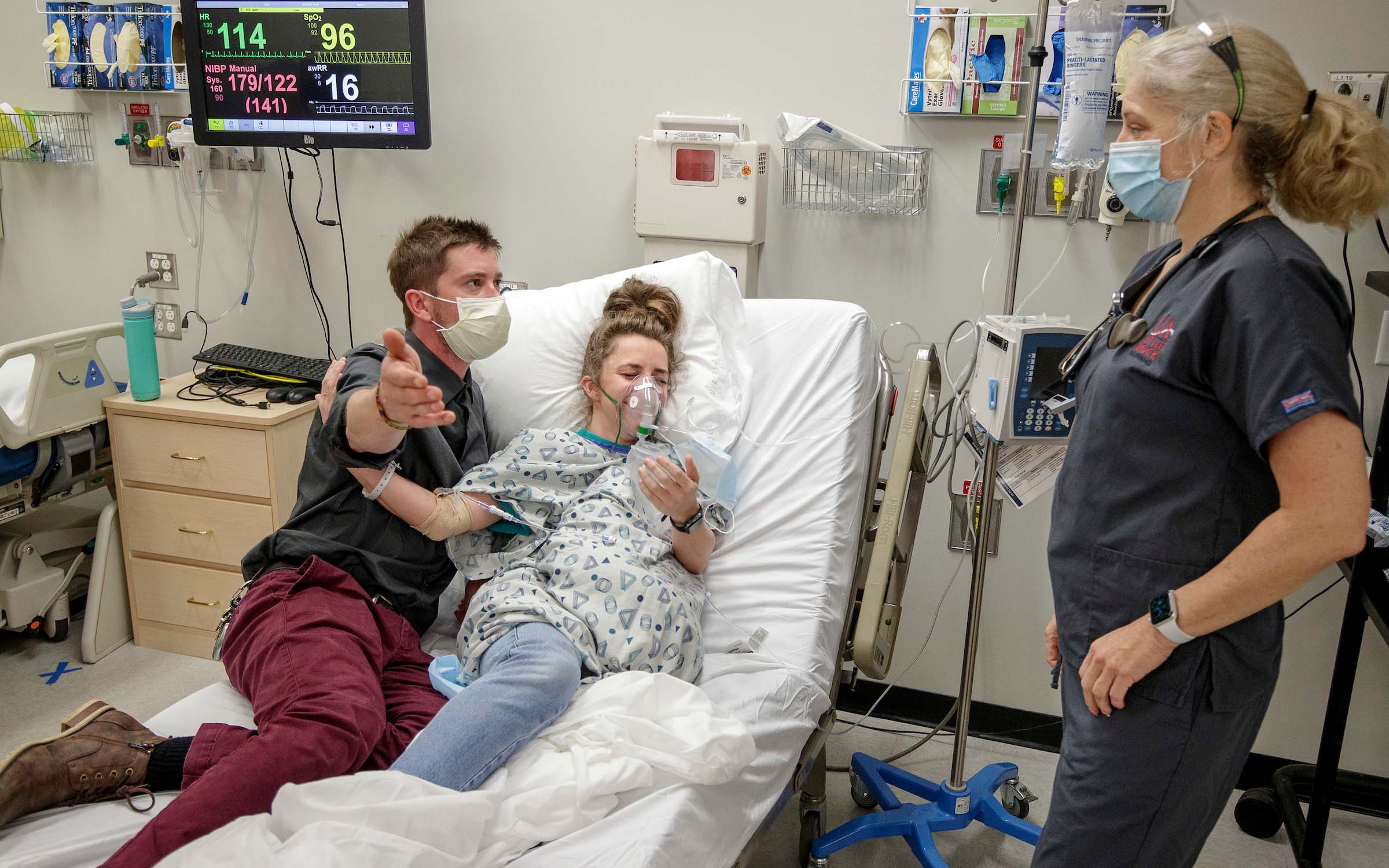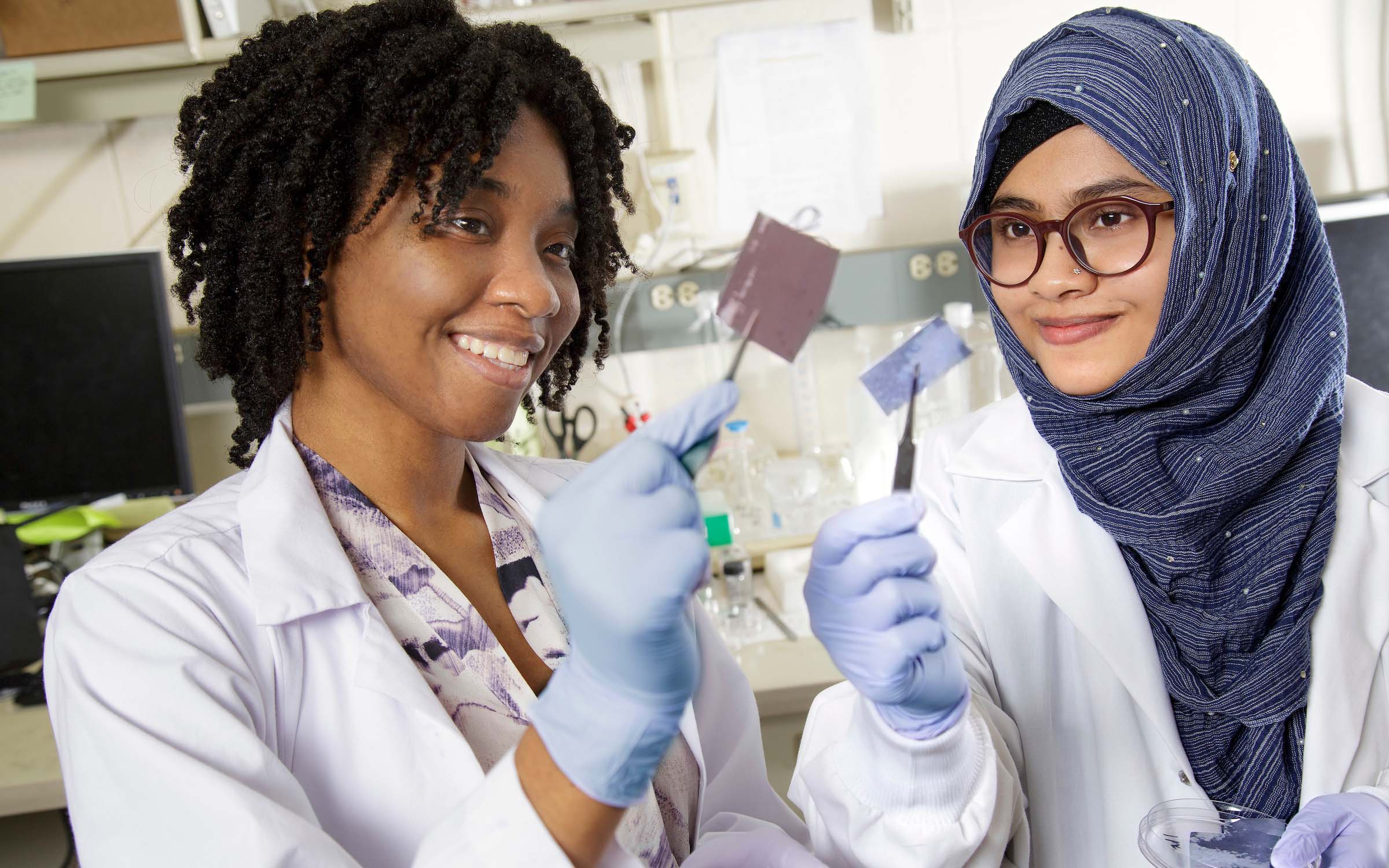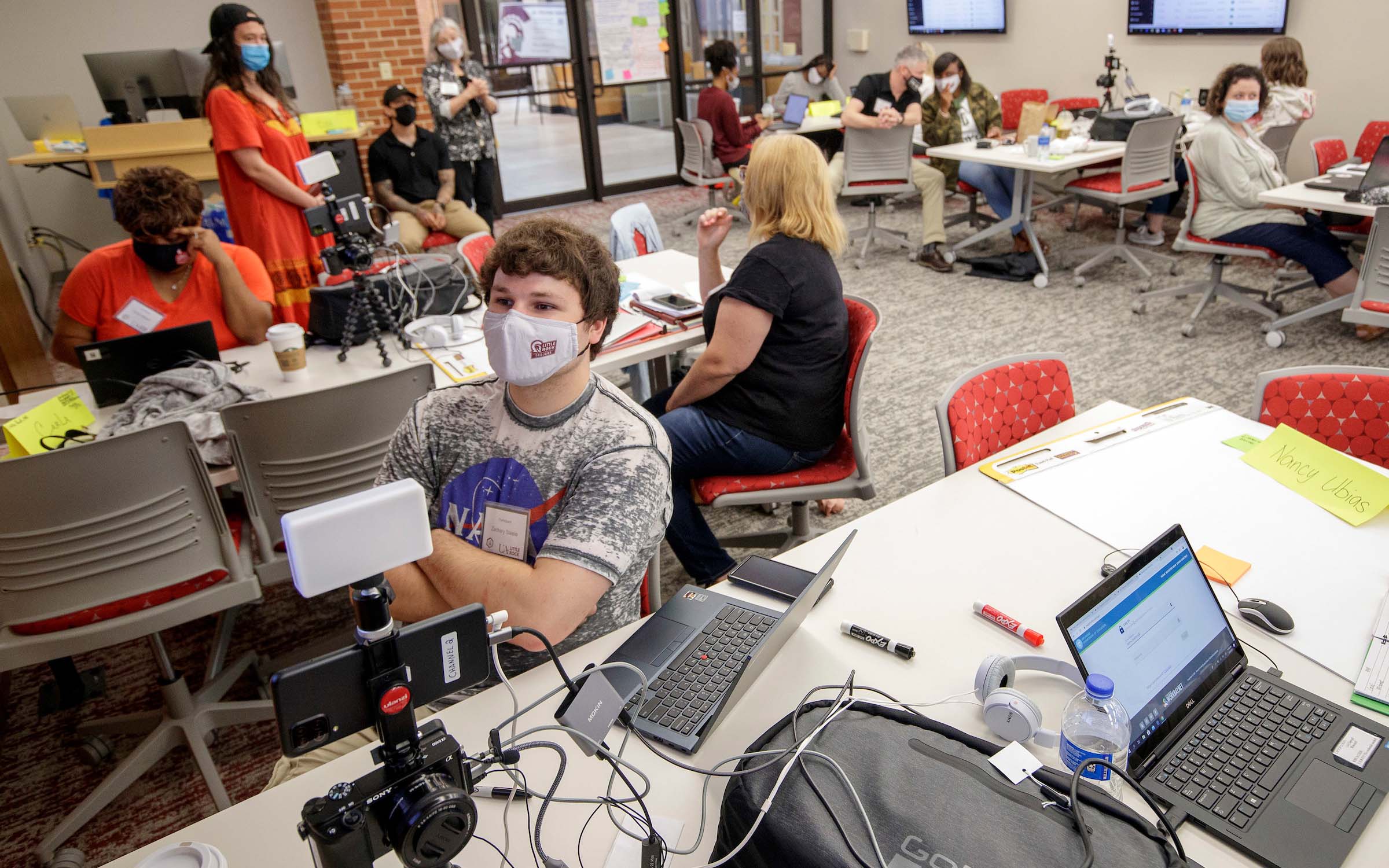UA Little Rock administrators, faculty and students look for return to normalcy
August 23-29, 2021
By Chloe McGehee and Remington Miller
For the past two and a half semesters, University of Arkansas at Little Rock students have attended class, taken exams and studied course content all while isolated in their dorm rooms and homes.
The number of in-person activities and classes on campus declined drastically in March 2020 after COVID-19 was declared a global pandemic, and the campus has not fully reopened since.
This semester marks the beginning of Phase Four of UA Little Rock’s plan to reopen campus. While there are concerns from students and faculty, especially with the new Delta variant, administration has long-been planning for the reopening of campus for the full school year.
Originally, Phase Four did not include a mask mandate, meaning students would not have to wear face coverings during class or around campus. However, in early August, all students received an email from UA Little Rock Chancellor Christina Drale detailing a new mask-wearing policy for the upcoming semester.
This followed a notice from Little Rock Mayor Frank Scott Jr. declaring a state of emergency that reinstated the requirement of face coverings in all indoor public places owned and operated by the city amid the spike in positive cases.
“We’ve just had the uptick. You see on the news that all the ICU beds across the state are filled up, and so you have to take public safety into account and our student safety,” Kindle Holderby, associate vice chancellor for Enrollment Management at UA Little Rock said. “We fully expect that [the pandemic] will be monitored throughout the semester, and that we’ll make changes as we need to.”
Holderby said UA Little Rock continues to do things to help students feel comfortable, such as implementing a COVID-19 task force, deep sanitation on campus, social distancing in classrooms and indoor spaces, as well as cutting tuition 50% for new students and forgiving previous debts for returning students.
“We’re cognizant of the issues and concerns students face,” Holderby said. “I think a lot of in person activities really help spur innovation, so I think it’s a necessity to have the campus reopen. I think it’s vital. I think that you have students of all different learning types and modalities and we have students that need the face to face.”
UA Little Rock’s administration also hopes to keep the transmission rate very low like in past semesters, Holderby said. With the more contagious Delta variant, new plans had to be made, but the campus is very prepared. In the end, the administration’s main goal is to support students and give them the most help possible.
“There is the question for students ‘are we going to pivot fully remotely,’ and the only thing I can say to that is we had an entire year of learning how to handle it,” Holderby said. “When [COVID-19] first hit the scene, we didn’t know what we were up against. Now that we’ve had a year to handle it, we’re very confident that we can have a campus that’s open and remains open and stay safe and react to some positive cases, how to react to it, how to treat it, to keep it from spreading.”
Delta dangers loom
To better accommodate the rising positive case numbers in Arkansas caused by the Delta variant, new policies are being implemented by the university’s Health Services Department, which now offers the Johnson & Johnson/Janssen vaccine available free of charge. During move-in week for campus residents and the first week of classes, there will be free vaccinations and sentinel testing for students and employees.
During the semester, the campus health services also provides access to the Rapid ID testing for students or employees that are symptomatic or have been in close contact two days before with an individual who tested positive for COVID-19 or began showing symptoms.
“For those who are symptomatic, we want people to call health services, and oftentimes there will be a telehealth visit to ask about what kind of symptoms the individual has to determine if they have the right symptoms to get a COVID test,” said Dr. Mike Kirk, director of UA Little Rock’s Health and Counseling Services.
For students wanting access to non-COVID-related services, appointments are available. Most will be scheduled as telehealth appointments, but if that is not applicable, then all patients must wear masks and will be screened before entering the office.
“Even before the mask mandate got reinstated, health services had been given permission to mandate masking inside health services, it only makes sense,” Kirk said.
In addition, counseling services were being held through Zoom, GoogleMeet or phone calls. While virtual and distance counseling will still be available, this semester, counseling will be offered in-person again. Kirk even said counselors could walk around campus with students to complete the appointment.
During the resurgence of stress with the new Delta variant, Kirk recommended one thing to help students with the beginning of a new semester.
“Self-care,” he said, describing the basic tenets as activity, nature, humor, meditation/breathing exercises and affirmations. Activity can be light, just enough to raise your heart rate. Students can find an activity they like such as swimming, biking, yoga, or walking around campus.
“We have to make it a priority. Being in academics you are in a state of anxiety anyway, because the moment you enter that class until you finish up that final you are being evaluated in some shape, form, or fashion. We have to find ways to keep our stress as low as possible,” said Kirk. “Tell yourself psychologically, I am owning this. I am doing this for me, to provide self-care for me.”
Students ready for return to routine from “COVID fatigue”
With all this administrative support, students are both concerned and excited to be back on campus, even with limited “true” college experiences.
“I feel okay about returning in the fall,” said Clara Mitchell, a junior Donaghey Scholar, “Especially as someone who is vaccinated, and takes art classes with smaller groups per class, I am not worried about it. UALR is not a heavily congested school in my short experience pre-COVID.”
Mitchell added: “The Delta variant is a little concerning, mostly because it is causing things to return to pre-vaccination days with the closing of establishments, having to wear our masks again (even as vaccinated folks since we are still susceptible to it). I hope there is a near future where COVID is less of a concern, but maybe that is wishful thinking.”
For a lot of students who started their college career last year, this is a reality. Most students may have lived on campus, but most classes in the last academic year were only offered online. The rise of the Delta variant and more COVId-19 cases in Arkansas does not promise this year will not be a repeat of 2020 as some classes have already transitioned to online formats.
Gage Taylor, a senior social work major, said he had conflicting feelings about the reopening.
“Personally, I’m just excited to be back at the dorms and continue my education,” Taylor said. “I am a bit nervous about how high the number of cases have risen here in Arkansas recently and I can certainly see those numbers rise with not only colleges but other educational institutions resuming for the school year.”
As a returning sophomore, Isabella Miller, added that she has never had in-person classes before.
“I am very excited and ready to return to campus this upcoming fall semester. I will actually have in-person classes this year, and that is something I am really looking forward to,” said Miller, a Donaghey scholar majoring in history and English. “I am worried about the in-person classes I am supposed to be taking going [to] online. One of them already has, and that alone was disappointing.”
Miller continued that the Delta variant is a concern for on-campus living. “I know I am doing everything I can to stay safe during the pandemic, like wearing a mask and getting vaccinated, but I cannot count on the entire student population on campus to do the same,” she said.
Senior Bennett Wood said he is really excited about coming back to campus this fall to see people’s faces and sit in a classroom.
“I’m nervous though, with the recent surge of COVID-19 cases here in Little Rock due to the Delta variant. So many people I have met recently are still staunchly opposed to getting the vaccine, which makes me apprehensive for in-person instruction this fall,” he said.
“The Delta variant has skyrocketed the amount of COVID-19 positive patients being hospitalized. The new variant has definitely brought on some heavy covid-fatigue for me,” continued Wood. “One of the main reasons I’m comfortable coming back to campus is because I am fully vaccinated. I’ve protected myself the best way I know how, and I’ll continue wearing a mask where and when I need to.”
Concerning UA Little Rock’s decision to reinstate the mask mandate, most students are happy with the choice.
“I was ecstatic when I got the email,” said Wood. “It made me feel more comfortable coming back to the classroom. If UALR could offer free, quick COVID-19 tests and make them widely available so (hopefully) we can stay ahead of any possible outbreaks on campus, [I would feel more comfortable]. This whole pandemic has added a layer of stress and uncertainty to my college experience. I haven’t let it discourage me though. I’m looking forward to walking across that stage and receiving my bachelor’s degree.”
Taylor also recalled reading the email about the mask mandate returning for students physically on campus, yet the policy does not ensure the complete safety of students. As student residents, Taylor and Miller are both worried.
“I can’t say that I’m all that surprised. I’d have been a lot more surprised and disappointed if the administration didn’t implement the mandate again,” said Taylor. “At that point, it would’ve been just plain ignorance of the situation we’re all in. Nevertheless, I am a little disappointed because that idea of things becoming normal, the normal before COVID appeared, simply blew away for the moment.”
“I honestly wasn’t surprised when UALR announced they were implementing the mask mandate again, nor was I disappointed,” Miller added. “I think that too many unvaccinated people were taking advantage of the CDC’s guidelines of removing mask mandates for vaccinated people. I would much rather we all wear masks than have blind faith in people being honest about their vaccination status.”
The college experience has also changed for everyone involved, which impacts multiple aspects of student lives. The pandemic has altered nearly every aspect of being a college student, leading to many emotions around student experiences the past two years.
“I could complain about this for a while. I won’t, but instead, try to answer this in the light of how it’s helped me as a person,” Mitchell said. “The pandemic has forced a lot of people to be alone, and leave us more time to sit and think about ourselves. As far as my college experience being affected by COVID, it stripped a lot of the social parts of college, like studying abroad, going to parties, seeing friends regularly, going to basketball games...the list is long. It’s an unusual college experience. That list being as long as it is sad, but it’s the tradeoff for the emotional intelligence some people have been able to develop during this time. I think if the pandemic never happened I may have been somewhat ‘happier’ but I don’t think I would have been as thoughtful. At least, not this soon.”
Ultimately, there are pros and cons to reopening the college campus during this uncertain time, but many students and faculty are excited to regain a sense of normalcy and community in the fall.
“College campuses to me are such a unique thing. I call it the spirit of the community,” Holderby explained. “It’s there. You feel the energy when you walk across campus. When you’re going into a classroom. I mean, even in the library, even though it’s quiet. You still see pockets of people studying for an exam or a research paper. To me, there’s no better place to feel that energy.”
[Editor’s note: Chloe McGehee and Remington Miller are both UA Little Rock students. They were selected to work this summer for The Daily Record, a member of the Arkansas Press Association, through the Association’s Arkansas Newspaper Foundation’s (ANF) annual internship program.]
PHOTO CAPTIONS:
1. UA Little Rock Chancellor Christina Drale in early August instituted a new mask-wearing policy for the upcoming semester, which began Aug. 16.
2. The UA Little Rock Center for Simulation Innovation (CSI) offers nursing students and healthcare professionals access to simulation-based clinical learning experiences. The 20-bed, 9,500-square foot state-of-the-art simulation hospital is located on the first floor of the university's Pat Walker Center for Nursing Education building.(Photos by Ben Crain)
3. Two student researchers examine samples in the physics lab at UA Little Rock.
4. Educators involved in the state-wide Ready For Life virtual video program participate in a training session at UA Little Rock this summer.







